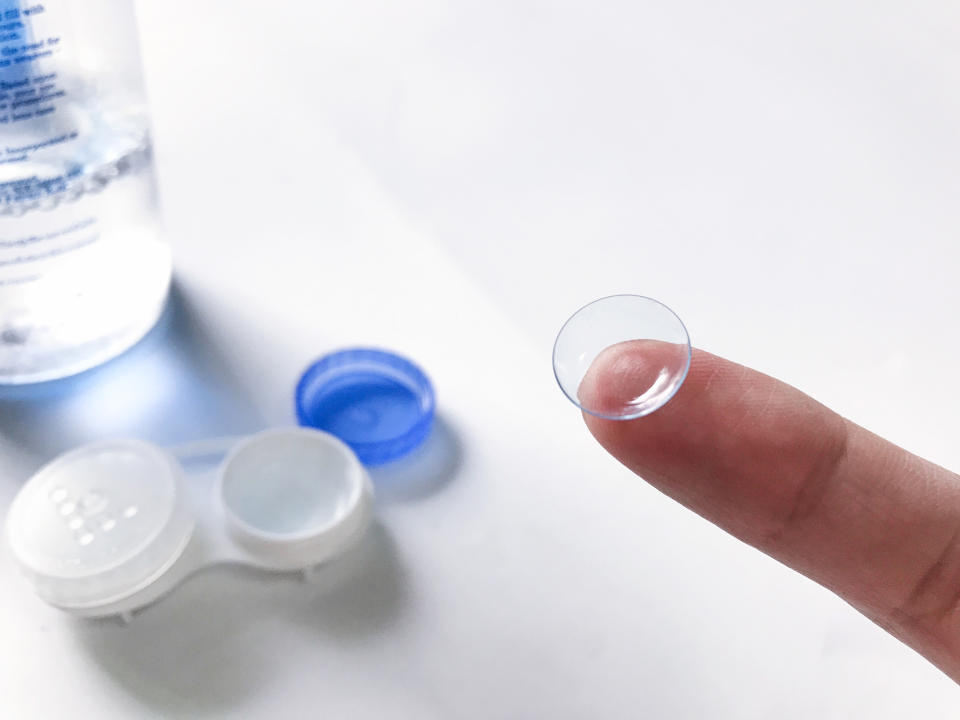Should you stop wearing contact lenses to prevent coronavirus?
Contact lens wearers may not be happy with this view, but the American Academy of Ophthalmology recommends people switch to glasses to help stop the spread of the coronavirus.
Aside from social distancing and hand washing, both the World Health Organization and the Centers for Disease Control and Prevention recommend people avoid touching their faces to prevent and slow the spread of the respiratory disease, and this may extend to wearing contacts. Whether it's putting in lenses or taking them out at the end of the day, those who wear contacts simply touch their faces and eyes more, even when they are not changing their lenses.

"Contact lens wearers touch their eyes more than the average person," according to an article on the AAO website. “Consider wearing glasses more often, especially if you tend to touch your eyes a lot when your contacts are in," advised Dr. Sonal S. Tuli, who reviewed the article. "Substituting glasses for lenses can decrease irritation and force you to pause before touching your eye. If you continue wearing contact lenses, follow these hygiene tips."
Experts also say that wearing glasses can act as a barrier to airborne droplets of the respiratory virus, although they do note that the virus can still enter the eye through the sides of glasses.
Download the TODAY app for the latest coverage on the coronavirus outbreak.
"Corrective lenses or sunglasses can shield your eyes from infected respiratory droplets," said the AAO. "But they don’t provide 100% security. The virus can still reach your eyes from the exposed sides, tops and bottoms of your glasses. If you’re caring for a sick patient or potentially exposed person, safety goggles may offer a stronger defense."
The CDC lists eye protection along with face masks under PPE or the personal protective equipment that health care workers wear to stop the spread of coronavirus.
"Those in a high risk environment, such as living with COVID-19 patients, may be better off with using glasses," Dr. David Chu, an associate professor in the department of ophthalmology at Rutgers New Jersey Medical School, told TODAY. "Furthermore, glasses can provide a barrier to the conjunctiva."
Currently, the CDC says there's “no evidence to suggest contact lens wearers are more at risk for acquiring COVID-19 than eyeglass wearers. Contact lens wearers should continue to practice safe contact lens wear and care hygiene habits.”
Dr. Thomas L. Steinemann, a clinical spokesperson for the AAO told TODAY that the academy views the situation in a different way. “The CDC is staffed by epidemiologists. They are looking at published data; what is known about this new virus. But the fact is, there’s not a lot known about COVID-19 and its behavior in the eye," he said.
"Ophthalmologists are physicians, we look at it a little differently. We look at what is known about other viruses and how they can be transmitted through tears asymptomatically. We also know that most patients don’t follow proper contact lens hygiene. Add that together with a dose of common sense, and we err on the side of caution, and suggest patients consider taking a break from contact lenses for a while.”
What about pink eye?
It's possible that coronavirus can cause conjunctivitis, an inflammation of the eye tissue, also known as pink eye. And while eye infection can be a telltale sign of coronavirus, it's important to put into perspective that not all itchy, watery eyes (especially during allergy season) mean that a person has COVID-19. Pink eye can also be caused by different viruses that are not coronavirus.
"Conjunctivitis is one of the manifestations of COVID-19, besides fever, cough, shortness of breath, diarrhea and others," said Dr. Chu. "For those with confirmed COVID-19 and conjunctivitis, or any other cause of conjunctivitis for that matter, contact lens use should be stopped immediately as lenses will not fit properly and may predispose these patients to corneal abrasion and possibly bacterial infection of the corneas, which is painful and potentially sight threatening."
If you're otherwise healthy and choose to continue wearing contacts, be sure to wash your hands correctly, take the lenses out regularly, practice good storage habits and disinfect your lenses before putting them back in your eyes.
Or maybe take a cue from Al Roker and give those new frames a try!

